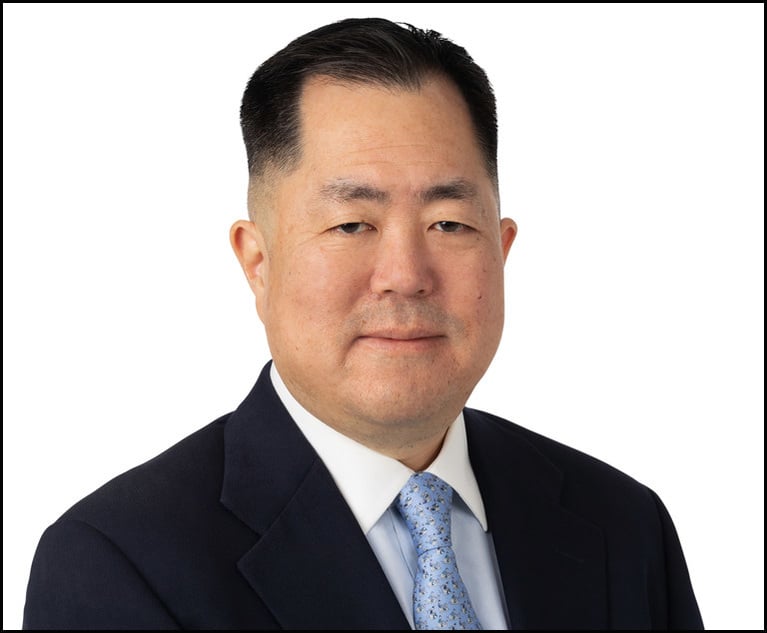 Chief Justice Tani Cantil-Sakauye of the California Supreme Court. Credit: Jason Doiy/ The Recorder
Chief Justice Tani Cantil-Sakauye of the California Supreme Court. Credit: Jason Doiy/ The Recorder'Frightening' Bar Exam Results, but No Plans to Lower Passing Score: California Chief Justice
"By all means, let's keep studying the issues, but that shouldn't hold us back from making the sensible decision to align the state's cut score with the rest of the nation," three law school deans wrote in a recent op-ed.
December 11, 2018 at 05:08 PM
4 minute read
Chief Justice Tani Cantil-Sakauye said Tuesday the state Supreme Court has no immediate plans to reconsider the passing score on the California bar exam despite a historically low success rate on the July test.
Fielding questions at her annual meeting with reporters in her San Francisco chambers, Cantil-Sakauye said the high court will wait to see the conclusions of two related studies, one assessing California law school students and the other considering what skills contemporary lawyers need and how those traits can be tested, before considering any action.
The pass rate on the July 2018 exam plunged to 40.7 percent, marking a 67-year low for the summer test.
“I understand what those numbers mean, and it's frightening,” Cantil-Sakauye said. “So we're continuing to take a review.”
More test-takers have failed the California bar exam than have passed it in each of the last five years. In the wake of those results, law school deans and some legislators last year pleaded with the Supreme Court to reduce the exam's required passing score, or cut score—the second-highest in the nation. The justices said then that they were “not persuaded” that changing the score was necessary “ at this time.”
“We know we still need to take a look and we're waiting for those [studies'] results to come in,” Cantil-Sakauye said. “And then we'll sit around this table, all seven of us, and we'll talk about these results and whether or not we should lower the exam score.”
The dismal pass rate on the July exam reignited the debate over the California test and its pass rate, which is significantly lower than those in other states. The state bar is nearing completion of a report analyzing data about law school students, their LSAT scores and other factors that may influence bar exam scores. The second job-skills analysis is expected to be completed in the summer of 2019.
 Jennifer Mnookin
Jennifer MnookinIn an op-ed last week in the Los Angeles Times, the deans of three California law schools called on the state bar, the Legislature and the state Supreme Court to lower the cut score.
University of California, Hastings College of the Law's David Faigman, University of San Diego School of Law's Stephen C. Ferruolo and University of California, Los Angeles' Jennifer Mnookin wrote that the high exam failure rate is hurting the job prospects of otherwise competent would-be lawyers. Moreover, they wrote, there's no proof the high bar for passing the test provides greater protection to the public from bad lawyers.
“By all means, let's keep studying the issues, but that shouldn't hold us back from making the sensible decision to align the state's cut score with the rest of the nation,” the deans wrote. “Until this happens, California's high failure rate remains both sui generis and a self-inflicted wound.”
The chairman of the Assembly Judiciary Committee also called on the bar and the Supreme Court to take a “fresh look” at the bar exam's viability.
“The longer the downward trend continues, the more likely it will be that highly qualified applicants to law school are deterred from pursuing a career in the law and will opt for other career paths,” Assemblyman Mark Stone, D-Scotts Valley, said. “The trend will further perpetuate the downward trajectory of bar passage rates, negatively affect diversity of the legal profession and the bench, and ultimately hurt public access to justice.”
|
➤➤ Sign up for Ahead of the Curve to stay up on the latest innovations in legal education. Learn more.
Read more:
This content has been archived. It is available through our partners, LexisNexis® and Bloomberg Law.
To view this content, please continue to their sites.
Not a Lexis Subscriber?
Subscribe Now
Not a Bloomberg Law Subscriber?
Subscribe Now
NOT FOR REPRINT
© 2025 ALM Global, LLC, All Rights Reserved. Request academic re-use from www.copyright.com. All other uses, submit a request to [email protected]. For more information visit Asset & Logo Licensing.
You Might Like
View All
Husch Blackwell Hires Former Adobe Counsel to Oversee AI Advisory Offering
3 minute read
Tyson & Mendes Appoints Cayce Lynch First Female Nationwide Managing Partner

DLA Piper Adds Former Verizon GC Amid In-House Hiring Spree

Pentagon Settles Suit Seeking to Clear Records of Service Members Discharged for Being LGBTQ
3 minute readTrending Stories
- 1Former Google Legal Exec Joins Ad Tech Unicorn as GC
- 2Fenwick and Baker & Hostetler Add DC Partners, as Venable and Brownstein Hire Policy Advisers
- 3H&R Block Accused of Negligence in Data Breach Suit
- 4Apple Disputes 'Efforts to Manufacture' Imaging Sensor Claims Against iPhone 15 Technology
- 5Following Treasury Hack, Do Federal Cybersecurity Standards Need an Update?
Who Got The Work
Michael G. Bongiorno, Andrew Scott Dulberg and Elizabeth E. Driscoll from Wilmer Cutler Pickering Hale and Dorr have stepped in to represent Symbotic Inc., an A.I.-enabled technology platform that focuses on increasing supply chain efficiency, and other defendants in a pending shareholder derivative lawsuit. The case, filed Oct. 2 in Massachusetts District Court by the Brown Law Firm on behalf of Stephen Austen, accuses certain officers and directors of misleading investors in regard to Symbotic's potential for margin growth by failing to disclose that the company was not equipped to timely deploy its systems or manage expenses through project delays. The case, assigned to U.S. District Judge Nathaniel M. Gorton, is 1:24-cv-12522, Austen v. Cohen et al.
Who Got The Work
Edmund Polubinski and Marie Killmond of Davis Polk & Wardwell have entered appearances for data platform software development company MongoDB and other defendants in a pending shareholder derivative lawsuit. The action, filed Oct. 7 in New York Southern District Court by the Brown Law Firm, accuses the company's directors and/or officers of falsely expressing confidence in the company’s restructuring of its sales incentive plan and downplaying the severity of decreases in its upfront commitments. The case is 1:24-cv-07594, Roy v. Ittycheria et al.
Who Got The Work
Amy O. Bruchs and Kurt F. Ellison of Michael Best & Friedrich have entered appearances for Epic Systems Corp. in a pending employment discrimination lawsuit. The suit was filed Sept. 7 in Wisconsin Western District Court by Levine Eisberner LLC and Siri & Glimstad on behalf of a project manager who claims that he was wrongfully terminated after applying for a religious exemption to the defendant's COVID-19 vaccine mandate. The case, assigned to U.S. Magistrate Judge Anita Marie Boor, is 3:24-cv-00630, Secker, Nathan v. Epic Systems Corporation.
Who Got The Work
David X. Sullivan, Thomas J. Finn and Gregory A. Hall from McCarter & English have entered appearances for Sunrun Installation Services in a pending civil rights lawsuit. The complaint was filed Sept. 4 in Connecticut District Court by attorney Robert M. Berke on behalf of former employee George Edward Steins, who was arrested and charged with employing an unregistered home improvement salesperson. The complaint alleges that had Sunrun informed the Connecticut Department of Consumer Protection that the plaintiff's employment had ended in 2017 and that he no longer held Sunrun's home improvement contractor license, he would not have been hit with charges, which were dismissed in May 2024. The case, assigned to U.S. District Judge Jeffrey A. Meyer, is 3:24-cv-01423, Steins v. Sunrun, Inc. et al.
Who Got The Work
Greenberg Traurig shareholder Joshua L. Raskin has entered an appearance for boohoo.com UK Ltd. in a pending patent infringement lawsuit. The suit, filed Sept. 3 in Texas Eastern District Court by Rozier Hardt McDonough on behalf of Alto Dynamics, asserts five patents related to an online shopping platform. The case, assigned to U.S. District Judge Rodney Gilstrap, is 2:24-cv-00719, Alto Dynamics, LLC v. boohoo.com UK Limited.
Featured Firms
Law Offices of Gary Martin Hays & Associates, P.C.
(470) 294-1674
Law Offices of Mark E. Salomone
(857) 444-6468
Smith & Hassler
(713) 739-1250






